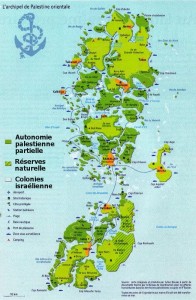A Viable Palestinian State?
 A small group of technocrats has doggedly kept at the hard work of designing a two-state solution for Israel and Palestine, long after the Oslo Process itself collapsed. Two of its longest serving advocates – Saeb Bamya, the Palestinian economist, and Ron Pundak, the Israeli director of the Peres Center for Peace – tried to answer the lofty (and perhaps rhetorical) question put forth by their host from The Century Foundation: After the Gaza blockade, can Palestine’s economy be viable?
A small group of technocrats has doggedly kept at the hard work of designing a two-state solution for Israel and Palestine, long after the Oslo Process itself collapsed. Two of its longest serving advocates – Saeb Bamya, the Palestinian economist, and Ron Pundak, the Israeli director of the Peres Center for Peace – tried to answer the lofty (and perhaps rhetorical) question put forth by their host from The Century Foundation: After the Gaza blockade, can Palestine’s economy be viable?
The two men made a concerted and heartfelt pitch for a return to the ethos of building two states side by side. According to Bamya, more than anything else Palestinians need a “normal business environment,” which requires Israel and the Palestinian Authority to implement the 2005 agreement on access and movement that would free the flow of people and goods between the West Bank, Israel and Gaza. He and Pundak insisted that only a two-state solution could accommodate both Jews and Palestinians.
Daniel Levy, a fellow at the New America Foundation who was a member of Israeli negotiating teams in the latter stages of Oslo and at the 2001 Taba conference, tried without success to pin the two-staters down to specifics: How exactly would they like to Israel and the United States to relate, economically, to Gaza and the West Bank?
I asked Bamya and Pundak at what point they would determine that a self-sustaining Palestinian state was no longer viable. Their answer, it appeared, was that there was no such point. “Everything is reversible if there is political will,” Bamya said. Pundak added, “We are basing everything on the solution of two states.”
The final questioner, retired Pakistani diplomat Ahmad Kamal, said he hated to appear impolite to the panelists, but said he thought all their assumptions were specious. In the long run, Kamal said, a Palestinian state “dissected” between two unconnected geographical regions, Gaza and the West Bank, would never be sustainable; nor, he said, was an Israel that had hostile relations with its neighbors and which depended on the backing of the United States. “What about the possibility of a one-state solution?” Kamal asked.
“One state won’t happen,” Pundak said emphatically. “We hate each other too much. We will kill each other.”
“I won’t kill you,” Bamya said, provoking some laughter.
“Our grandchildren who don’t exist yet would kill each other,” Pundak earnestly replied.
“Inshallah,” said Daniel Levy, bringing down the house.

